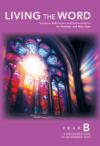Scripture Study for
Tenth Sunday in Ordinary Time
1 Kings 17:17–24 / Psalm 30:2a / Galatians 1:11–19 / Luke 7:11–17
<< Back to LECTIONARY RESOURCES
Understanding the Word
By Dianne Bergant, C.S.A.
As was the custom of the day, the woman in the first account offers hospitality to one in need, but then she suffers misfortune. She links the illness of her son with the entrance of the prophet into their lives. It is not the power from the body of the prophet that restores the boy, but the power of God working through the prophet. When her son is restored to her alive, the woman responds with an act of faith. Her living son is proof that God’s power works through this man of God, in a foreign land, for the benefit of a widow.
Paul admits that he was originally a zealous adherent to the traditions of the ancestors, probably a reference to the oral traditions that the Pharisees developed as they interpreted the scriptures to meet the needs of their time. He certainly knew about Jesus, for he persecuted some of his followers. Paul asserts his independence from other apostles, insisting that he is now a disciple of no one but Jesus Christ. While such insistence reveals a man of strong conviction, it may have been seen by some as arrogant self-confidence. Paul must have realized this, for he credited the grace of God for his change of heart.
Jesus and his disciples encounter a funeral procession leaving the city that they are about to enter. The deceased is the only son of a widowed woman. This is an unusual miracle, for Jesus seems to have performed it out of his own deep emotion rather than in response to someone else’s request or demonstration of faith. The vulnerable position in society of this widow is the same as that of the widow of Zarephath of Sidon in the first reading. Not only is she suffering the grief of loss, she now is also bereft of a legal advocate. The miracle demonstrates the presence of the reign of God in the lives of people who believe.
